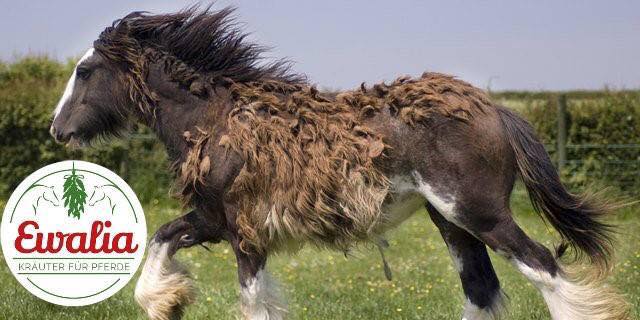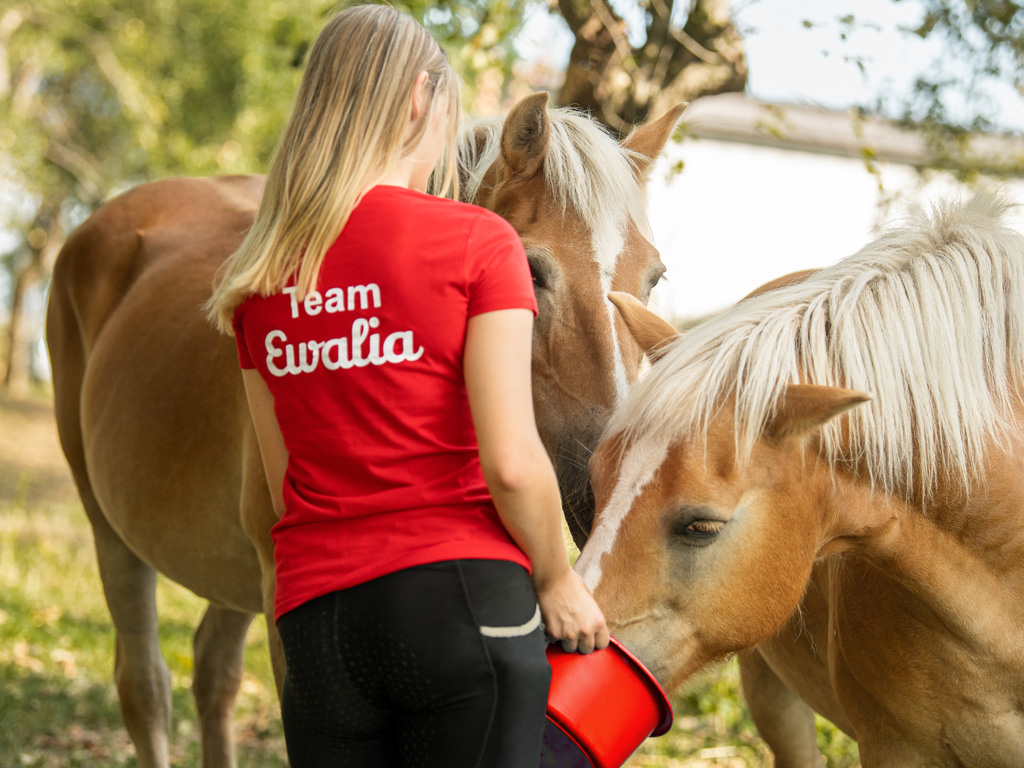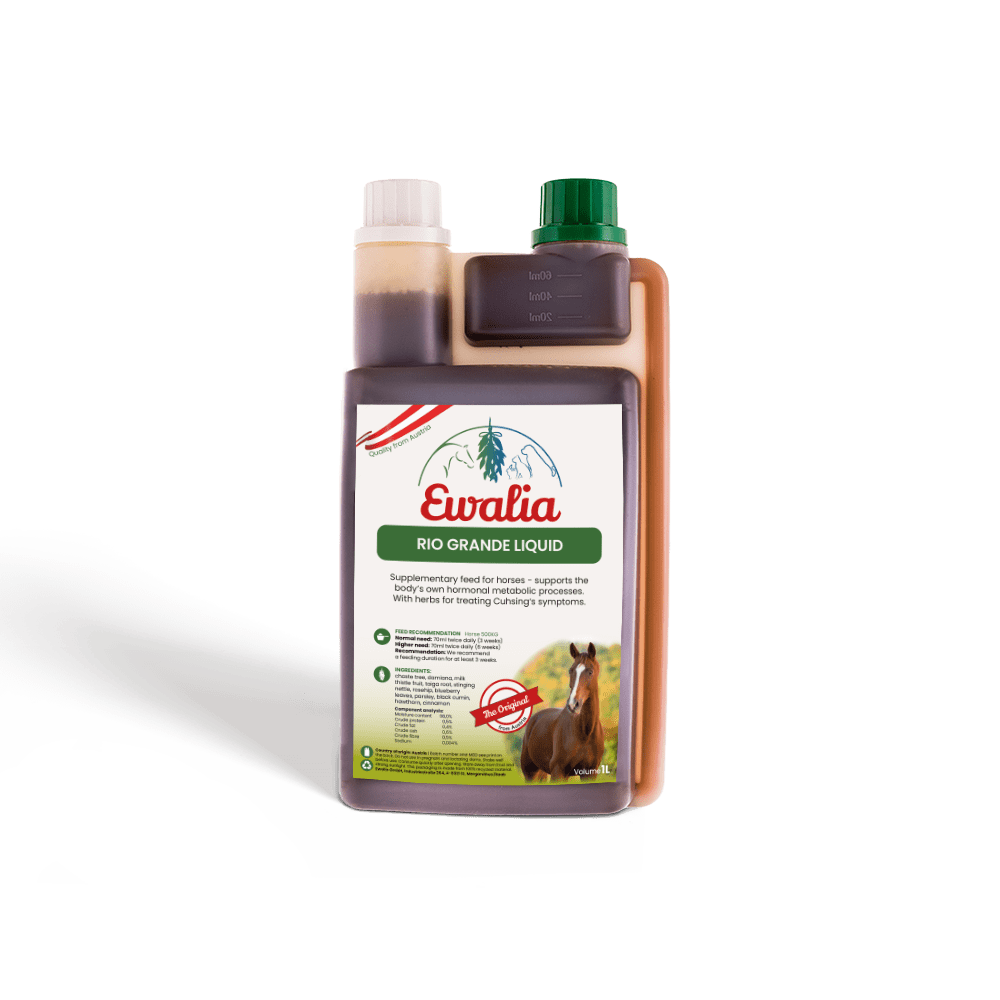Cushing's in horses!

If your horse shows marked changes in behaviour or appearance, such as skin change problems, laminitis, weakened immune system, cardiovascular problems, fat deposits or other symptoms, your horse probably suffers from Equine Cushing's Syndrom (ECS), also popularly known as just Cushing's. This is a very complex disease that is currently not curable. The horses that contract it are typically and almost without exception 15 years old or older. Younger horses can also suffer from Cushing's, but that is very rare.
What is Cushing's and what causes it?
Cushing's is a disease of the pituitary gland. This gland is responsible for the production of many hormones in the horse's brain. The hormones reach the body through the bloodstream. In healthy horses, the balance of hormones is responsible for the maintenance and regulation of many bodily functions.
With Cushing's the middle part of the pituitary gland, the so-called pars intermedia, is limited in its functioning. In international specialist circles the disease is also called Pituitary Pars Intermedia Dysfunction (PPID).
It has been determined that dopamine production in the brain is restricted in horses with Cushing's. The messenger substance dopamine has an important control function on the middle part of the pituitary gland, which among other things is responsible for the production of the hormone ACTH (adrenocorticotropic hormone). This in turn orders the adrenal cortex to release cortisol. Due to the lack of dopamine, Cushing's patients often develop a benign tumour in the pituitary gland. This can lead to an overproduction of ACTH, cortisol and some other hormones.
The hormonal balance is disrupted. The clinical picture usually develops gradually, with many different symptoms, and remains unrecognised for a long time.
Diagnosing Cushing's has become fashionable over time. Almost every stable now has one or more horses with the disease. Yes, appearances are not deceptive; in the past, Cushing's was not diagnosed as frequently as in recent times. On the one hand, the increase in diagnosed Cushing's cases is certainly due to the fact that blood tests are becoming more and more widespread and accurate, and that more and more time and money are being invested in the health of our leisure partners.
On the other hand, some are of the opinion that Cushing's is caused by a derailment of the metabolism, which can be caused by husbandry and feeding that are not species-appropriate, chronic stress and insulin resistance. This form of the disease is also called pseudo-Cushing's. Pseudo-Cushing's refers to a metabolic disorder that consequently disrupts the hormonal balance. In horses suffering from pseudo-Cushing's, the symptoms disappear almost completely if the metabolism is extensively rehabilitated and possible stress factors are suppressed.
Cushing's is not one of the typical lifestyle diseases of today, such as cardiovascular diseases, diabetes and many more. Rather, the causes of this disease are often attributed to various forms of husbandry (lack of exercise, social restriction, stress, overworking ...).
Cushing's: Symptoms
The first symptoms are often ambiguous and in many cases incorrectly classified in the beginning. Due to the severe hormonal changes described above, the following symptoms may manifest:
- Thick, long, in the clearest cases curly coat, delayed or hardly occurring coat change
- Fat pads
- Weight loss
- Laminitis (mostly chronic)
- Cardiovascular problems
- Arteriosclerosis
- Excessive thirst - causing excessive urination
- Muscle wastage, especially on the back (sway back), but also on the belly (hanging belly)
- Depression
- Blindness, head beating, dementia
- Weakened immune system
- Unprovoked and patchy sweating
- Hyper-extended pasterns
- Irregular cycle, infertility, milk production in mares that are not pregnant
- Poor wound healing
- Sores on the mucous membranes of the mouth
All these may be symptoms of Cushing's. The three most significant and common symptoms of Cushing's, however, are disorders of change of coat, laminitis and changes in appearance:
- Coat change disorders:
Long and dense, usually different coloured fur tufts and curly fur are classic signs of Cushing's. At the onset of the disease there are conspicuously longer hair on the head and the back of the legs. The coat usually changes slowly. It is often observed that individual long hairs from the winter coat remain in place in summer.
- Laminitis:
Laminitis occurs in more than half the affected horses, often in recurrent spurts. Laminitis is the most serious symptom in many horses with Cushing's and can even be life-threatening. Circulatory disorders of the laminae, which can occur due to hormonal factors, and the inflammations which are usually caused by these, lead to this extremely painful and recurrent accompanying disease.
- Change in appearance:
The muscle loss and weight loss usually lead to sway backs and hanging bellies in affected horses. The typical fat redistribution caused by Cushing's manifests itself in fat deposits in unusual places, usually over the eyes, on the mane comb, right through to the typical bacon neck.
Your vet can use a simple blood test to determine whether your horse has Cushing's or not. If Cushing's is suspected, the daily cortisol levels should be determined first of all. It is absolutely essential to measure the cortisol levels daily, as they can fluctuate wildly from day to day. The ACTH level in the blood is also identified in the blood test that the vet does. This is the diagnostic method that is most often used in practice. Almost 90% of horses with Cushing's have elevated ACTH levels. There are a small number of exceptions where, despite clear signs of Cushing's, the blood tests are negative. Exceptions confirm the rule: some horses have extremely high blood levels and almost no symptoms, while other display very clear and strong symptoms, with almost normal blood levels. In any case, we recommend consulting a veterinarian for clarification whenever Cushing's is suspected.
Cushing's: Treatment and support
A horse that suffers from Cushing's or that shows symptoms should always be treated by a veterinarian, as otherwise serious co-morbidities such as laminitis can further increase the suffering of the horse. Cushing's is not curable yet, but the patient can often be kept symptom-free with a variety of treatments. Which is of course the best for both horse and owner!
Your veterinarian will more often than not prescribe treatment with the product Prascend. These tablets, which are given long-term or even on a permanent basis, are very expensive. The use of the tablets can in some cases be reduced by adapted care measures and feed supplements.
Here are a few tips and tricks for offering horses with Cushing's disease a better and more symptom-free horse life:
- Avoid stress. The affected horse should be given a secure, pleasant and familiar living space in his habitual environment.
- Sufficient feed and water should be available at all times.
- Clip the coat in summer if possible, and use blankets when it's cold
- Groom regularly to prevent skin diseases
- Keep the hooves in a good and well-groomed condition
- Have the teeth checked regularly by a vet
- Avoid contact with strange horses
- Deworm regularly
- Adapt the feed
EWALIA Rio Grande liquid
We developed this special herbal liquid with great expertise and love for Rio Grande, who has been with us since he was a foal and is now a proud 27-year-old senior. This liquid is composed of the following herbs: Chaste tree, damiana, milk thistle fruit, taiga root, stinging nettle, rosehip, blueberry leaves, parsley, black cumin, hawthorn, cinnamon. Some of these herbs are among the notorious and promising adaptogenic herbs, which are said to have a healing and regulating effect!
The 100% natural high-quality herbal extract, specially developed for horses, is manufactured without adding chemicals or sugar and supports the body's own hormonal metabolic processes. Contains precious cush herbs. Very good results have already been achieved with these herbs in horses with Cushing's. This liquid can provide complementary support to treatment for Cushing's.














